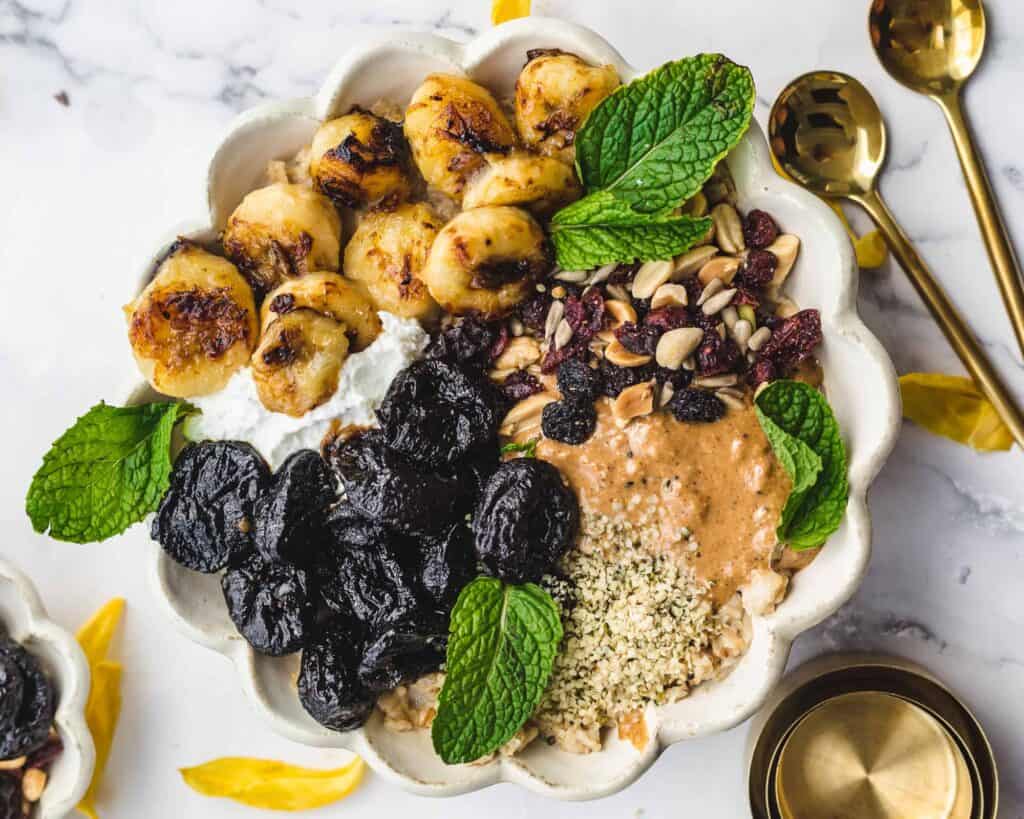
Prunes Found to Modify the Gut Microbiome in Postmenopausal Women
Mental, digestive, immune, bone and cardiovascular health, in addition to weight management show a connection with to health of the gut microbiome. Learn more in this article from California Prunes RDN Andrea Giancoli.
By Andrea N. Giancoli, MPH, RD
There seems to be headlines weekly, sometimes even daily, about new research regarding the gut microbiome, gut microbiota and the connection to a variety of health outcomes. Here are details of a recent study.
Why the gut microbiome matters:
Cognition, mental health, cardiovascular health, weight management, diabetes development, bone status, digestive health, immune health, nutrient status, and more have been tied to the health of the gut and its microbiota makeup. Lifestyle factors such as smoking, exercise, stress, body weight, and of course, diet and food choices can all impact the composition of the gut microbiota for better or worse[i]. As nutrition professionals, it is essential for us to better understand how dietary choices can affect the gut microbiome, and in turn, how they correlate to better or poorer health outcomes.
Study reports prunes appear to favorably impact the gut microbiome:
We are excited to share the results of a recently published study. It reports prunes appear to favorably impact the gut microbiome. The study, Prune supplementation for 12 months alters the gut microbiome in postmenopausal women[ii], was conducted at Pennsylvania State University and published in the journal Food & Function late last year. The authors found that 12 months of daily prune consumption appeared to have sustained beneficial impacts on the gut fecal microbiome of postmenopausal women. In particular, prune consumption showed an enrichment in the bacteria from the Lachnospiraceae family, as well as a reduction in Clostridium sensustricto 1, which is considered to be pathogenic. Lachnospiraceae are a group of bacteria known to produce short-chain fatty acids. They are associated with phenolic metabolism and immunomodulatory (stimulating or suppressing the immune system) effects, notably decreasing the proinflammatory cytokines IL-1β and IL-6.
Lachnospiraceae have previously been shown to be effective immunomodulators that maintain the gut epithelial barrier, ensuring nutrients can pass through the gut and not toxins, and may protect against the progression of inflammatory bowel disease via anti-inflammatory activity[iii].In short, the Lachnospiraceae enriched by prunes may be involved in producing anti-inflammatory short chain fatty acids and the phenolic metabolites from prunes that participate in immune regulation, facilitating favorable health outcomes from sustained prune consumption in postmenopausal women.
More to come:
Stay tuned. We expect more news to come out of this study. We may report specific health benefits that correlate to the changes to the gut microbiome from eating prunes long term.
Find new ways to enjoy prunes in our recipes section.

References:
[i]Conlon MA, Bird AR. The impact of diet and lifestyle on gut microbiota and human health. Nutrients. 2014 Dec 24;7(1):17-44. doi: 10.3390/nu7010017. PMID: 25545101; PMCID: PMC4303825.
[ii]Simpson AMR, De Souza MJ, Damani J, Rogers C, Williams NI, Weaver C, Ferruzzi MG, Chadwick-Corbin S, Nakatsu CH. Prune supplementation for 12 months alters the gut microbiome in postmenopausal women. Food Funct. 2022 Nov 28;13(23):12316-12329. doi: 10.1039/d2fo02273g. PMID: 36350082.
[iii]Vacca M, Celano G, Calabrese FM, Portincasa P, Gobbetti M, De Angelis M. The Controversial Role of Human Gut Lachnospiraceae. Microorganisms. 2020 Apr 15;8(4):573. doi: 10.3390/microorganisms8040573. PMID: 32326636; PMCID: PMC7232163.
Try a new idea, from borscht to smoothies, in our recipe section. That should help with daily prune consumption! Learn more about how prunes also support bone health here. See why prunes are a great pantry staple here.